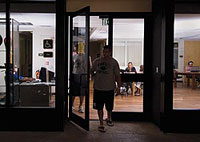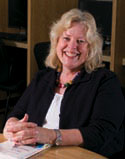Athletes Gain from Academic Strength Training

Adjusting to college classes, dorm life and homework can be a trial for any student. Newfound freedom, social opportunities and being away from home—in some cases, far away from home—increase the stress. For student-athletes, the pressure is even higher, with training, practice, travel and competition added into the mix.
Enter the advisors, mentors, graduate assistants and tutors who serve as academic coaches.
University of Hawaiʻi at Mānoa Student Athlete Academic Services Program Director Jennifer Matsuda knows how exhausting road trips can be; she has traveled with the men’s basketball team, supervising study halls, proctoring exams and tutoring athletes.
"There is never a direct flight to some of the places where we compete, like Moscow, Idaho. After several plane and bus rides, we’re jetlagged, it’s winter and there is a full schedule of study hall, practice and games. Not to say that it’s not fun, but it takes a lot out of you."

Jennifer Matsuda
Denise Abara, a former Rainbow Wāhine soccer player, joined the staff as a graduate assistant nine years ago. She is now one of seven advisors who are assigned to specific teams and have additional areas of program responsibility. She advises diving, golf, soccer, softball and swimming plus oversees the complexities of academic eligibility for all athletes.
"We develop relationships with the coaches and the players that last for years," she explains. "Having a trusting relationship with coaches and players is all important."
Student-athletes can request help from academic tutors in any subject at any time. The Nagatani Academic Center adjacent to Mānoa’s Stan Sheriff Arena also offers mentoring to develop good academic reflexes—honing skills in time management, studying, note-taking and reading.
For Courtney Tsumoto (BA ʻ05 Mānoa), a student job as a tutor lead her to pursue graduate studies in educational psychology that complement her work as a mentor and tutorial coordinator.
Some students go from overwhelmed to self sufficient, she observes. "When they get the basics, they're fine."
The staff emphasizes the importance of school. "Athletes who make it professionally are glorified, but you don’t hear much about the ones who don’t," says graduate assistant Sachi Lamb. "Their families say ʻI know you can.’ Coaches say ʻI know you can.’ We want to be supportive but at the same time say, ʻYou have to have a backup plan.’"
For years academic services for University of Hawaiʻi at Hilo student-athletes were handled informally and on a volunteer basis. With the number of athletes increasing—up to 200 in 2007—the campus refitted a storage room as a computer lab open for study hall all day and some evenings.
Lead by Assistant Athletic Director and former student athlete Gwen Kagaoan, Hilo staff run study halls for student-athletes, do grade checks, liaise with professors and provide academic counseling.
Kagaoan, who also helps coach Vulcans softball, celebrates students’ academic achievements. "One athlete was an average student, about a 2.0 or 2.5 GPA. She came to us and applied herself and in one semester made a 3.62 and got onto the dean's list," says Kagaoan. "Seeing students get excited about doing well in school is great. It’s really fun to show them it can be done."